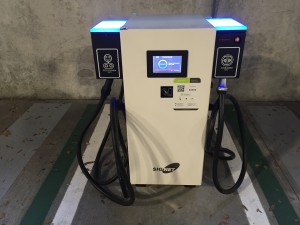
As opposed to several hours, electric-vehicle owners at USF St. Petersburg can now get a full charge in 30 minutes.
Seven Nissan Quick Chargers, known as Level 3 chargers, will be installed in the Tampa Bay area this month. One of these chargers has been installed in the USFSP parking garage.
The chargers are compatible with the Nissan Leaf (which needs a special adapter), Tesla S, Kia Soul, and Volkswagen and BMW electric vehicles. Because most drivers will not need to fully recharge their vehicle, they will only need to spend about 15 minutes at the station.
Students and the public can use the charger for free. But they can’t go far: Vehicle owners who keep their car at the station after it has charged will be ticketed, according to Jennifer Winter, USFSP sustainability coordinator.
The charging station was donated by Nissan and Duke Energy, which have connections with NovaCharge, a manufacturer of powerful EV chargers. It cost $30,000 to manufacture and $5,750 to install. Much of the power used by the quick charger will be supplied by solar panels.
“The solar panels that are installed above the parking garage will reduce the amount of energy used by the quick charger and regular (Level 2) chargers,” said USFSP sustainability coordinator Jennifer Winter. The solar panels were also donated by Duke Energy.
A dashboard that is accessible online for both the Level 2 and Level 3 chargers shows how much battery life the car has, how many kilowatts have been used, and the amount of gas saved. This not only helps monitor how long a vehicle has been charging, but shows the benefits of owning an electric vehicle.
Both Duke Energy and the USF College of Engineering will be monitoring the station to further their knowledge of sustainability. For educational and research purposes, they will be measuring what and how much the battery stores and discharges.
“I hope the installation of this charger will incentivize students and others in the community to purchase electric vehicles,” said Winter. “EVs save money in gas, decrease greenhouse gas emissions and promote sustainability.”


